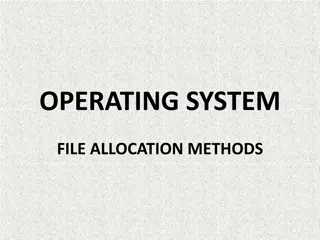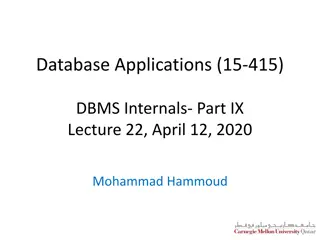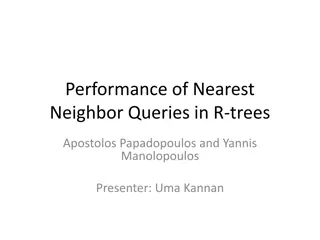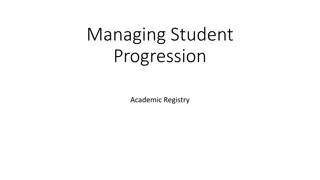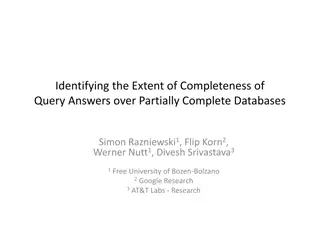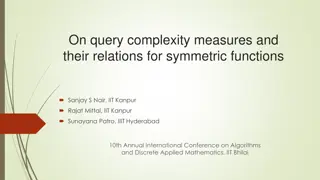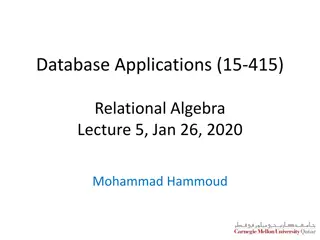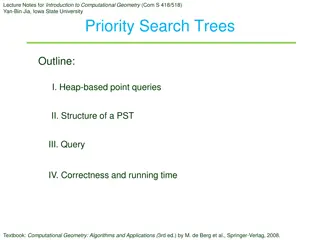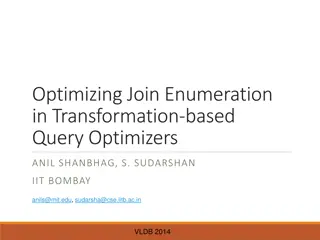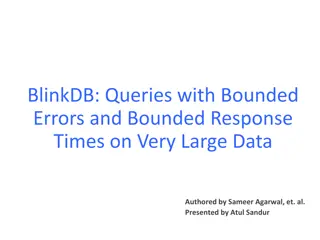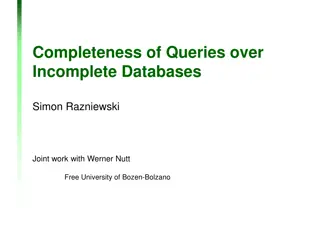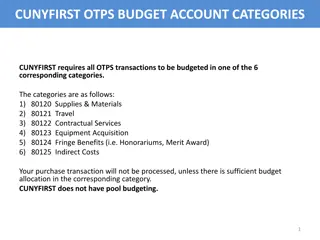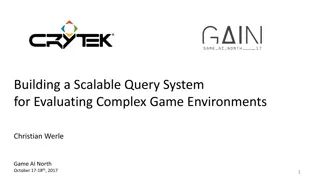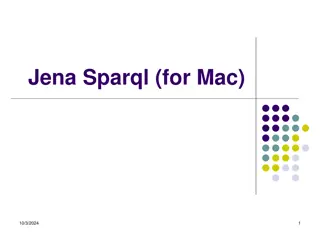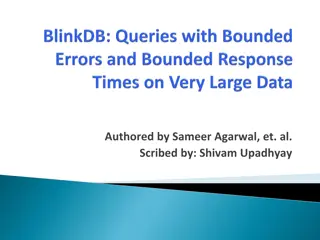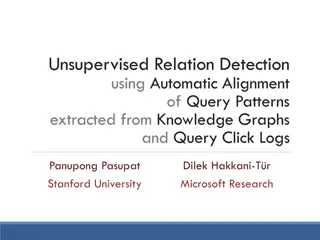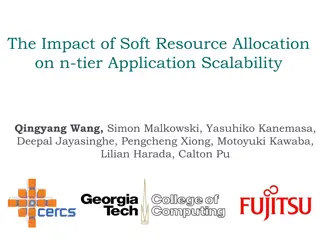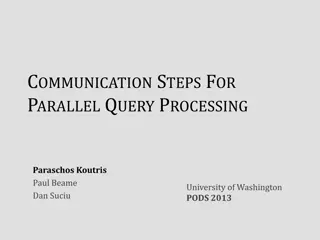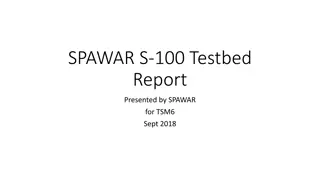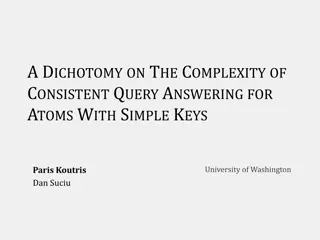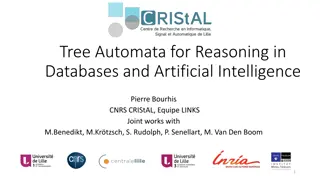Enhancing Query Optimization in Production: A Microsoft Journey
Explore Microsoft's innovative approach to query optimization in production environments, addressing challenges with general-purpose optimization and introducing specialized cloud-based optimizers. Learn about the implementation details, experiments conducted, and the solution proposed. Discover how
2 views • 27 slides
Understanding Epistemic Progression in Learning: A Humanities Perspective
Exploring the concept of epistemic progression and its importance in education, this content delves into Basil Bernstein's theories on knowledge structure, trends in history education, and the role of procedural knowledge in fostering progression in disciplines like History.
1 views • 10 slides
Understanding File Allocation Strategies in Operating Systems
Explore various file allocation schemes like extent-based systems, linked allocation, file allocation table (FAT), indexed allocation, and combined schemes used in operating systems. Learn about their pros and cons, including details on maximum file size calculations based on disk block sizes and po
0 views • 20 slides
Operating System: File Allocation Methods
File allocation methods in operating systems determine how files are stored in disk blocks. The main methods include Contiguous Allocation, Linked Allocation, and Indexed Allocation. Contiguous Allocation involves allocating blocks in a contiguous manner for efficient disk space utilization and fast
0 views • 14 slides
Efficient Budget Query Process in Self-Service Banner 9.0
Accessing and navigating the Self-Service Banner 9.0 for budget queries can be simplified by following a step-by-step guide. From initiating a new finance query to selecting relevant columns and submitting the query, this process ensures accuracy and efficiency in tracking budget status by account.
0 views • 19 slides
Query Optimization in Database Management Systems
This content covers the fundamentals of query optimization in Database Management Systems (DBMS), including steps involved, required information for evaluating queries, cost-based query sub-system, and the role of various components like query parser, optimizer, plan generator, and cost estimator. I
0 views • 51 slides
Understanding Active Learning in Machine Learning
Active Learning (AL) is a subset of machine learning where a learning algorithm interacts with a user to label data for desired outputs. It aims to minimize the labeling bottleneck by achieving high accuracy with minimal labeled instances, thus reducing the cost of obtaining labeled data. Techniques
0 views • 17 slides
Performance of Nearest Neighbor Queries in R-trees
Spatial data management research focuses on designing robust spatial data structures, inventing new models, constructing query languages, and optimizing query processing. This study explores the estimation of query performance and selectivity, specifically in R-trees, for efficient access planning.
1 views • 32 slides
GrabMe Viewer Quick Start Guide by YENDA COMPANY
GrabMe Viewer is a software designed to assist in setting up and organizing presentation playlists for online meetings on Zoom or Teams. The Quick Start Guide covers installation instructions, supported files and operating systems, file loading process, sharing screens on Teams and Zoom, and benefit
0 views • 14 slides
Comprehensive Guide to iCn3D Structure Viewer Features
Explore the diverse functionalities of iCn3D Structure Viewer through this detailed tutorial by Jiyao Wang, emphasizing H-Bonds, Interactions, Electrostatic Potential, Alternate Mutant, Wild Type, VAST+ Alignment, Multiple Chain Alignment, and more. Learn how to utilize different views, graphs, tabl
0 views • 17 slides
Risk Allocation for Allocation Wells in Energy Law
Definition of allocation wells in energy law, advantages and disadvantages, lessees' rights, allocation of production to mineral owners, and legal cases related to pooling agreements. The content discusses various aspects of risk allocation for unagreed horizontal wells and the importance of clear a
0 views • 16 slides
Managing Student Progression in Academic Registry
This content provides detailed information on managing student progression in an academic registry, covering topics such as academic framework, boards of examiners, mark finalization, module verification, referral requirements, personal tutorial assessments, student progression criteria, assessment
0 views • 15 slides
Streamlining Student Admission Process with Data Upload and Query Viewer
Simplify the student admission process by allowing users to upload personal and academic data using a Student Data Template. Learn how to extract student information and verify uploads through a detailed flow chart. Enhance efficiency with the Query Viewer feature for accessing and searching student
0 views • 61 slides
Efficient Student Track Allocation Process
The Student Track Allocation process enables users to streamline student progression by uploading a specific file acquired from Query Viewer User Role. This process is designed for Secondary and Sports School career students, allowing for the management and verification of student programs and plans
2 views • 58 slides
Spatial Stream Allocation in IEEE 802.11-20 Trigger Frames
The document discusses spatial stream allocation in IEEE 802.11-20 trigger frames, specifically focusing on the SS Allocation subfield. It explains how trigger frames allocate resources for TB PPDU transmissions and solicit User Info fields, detailing the RU Allocation and SS Allocation subfields. T
3 views • 15 slides
Shifting Bloom Filters at Peking University, China
Explore the innovative research on Shifting Bloom Filters conducted at Peking University, China, featuring evaluations, conclusions, background information, and insights on membership, association, and multiplicity queries. The study delves into hash functions, theoretical results, and the Shifting
1 views • 25 slides
Identifying Completeness of Query Answers in Incomplete Databases
The study delves into how to assess the completeness of query answers when dealing with partially complete databases. By analyzing data from a telecommunication company’s data warehouse, the query results are examined to determine if all warnings generated by maintenance objects with hardware team
0 views • 23 slides
Quantum Query Complexity Measures for Symmetric Functions
Explore the relationships between query complexity measures, including quantum query complexity, adversary bounds, and spectral sensitivity, in the context of symmetric functions. Analysis includes sensitivity graphs, the quantum query model, and approximate counting methods. Results cover spectral
0 views • 19 slides
Understanding Relational Query Languages in Database Applications
In this lecture, Mohammad Hammoud discusses the importance of relational query languages (QLs) in manipulating and retrieving data in databases. He covers the strong formal foundation of QLs, their distinction from programming languages, and their effectiveness for accessing large datasets. The sess
0 views • 39 slides
Introduction to Priority Search Trees in Computational Geometry
This lecture outlines the structure and query process of Priority Search Trees (PST) in computational geometry. It covers heap-based point queries, range trees for windowing queries, handling query ranges in 1D and 2D spaces, and using heaps to efficiently handle query ranges. The content discusses
1 views • 18 slides
Transforming S4C Content Strategy for Future Success
S4C aims to evolve its content strategy over the next 3 years to diversify its viewer demographic and reduce dependency on its aging core audience. Through creating conversations, igniting imaginations, and touching hearts, S4C plans to engage younger viewers while maintaining its existing audience.
1 views • 25 slides
Optimizing Join Enumeration in Transformation-based Query Optimizers
Query optimization plays a crucial role in improving database performance. This paper discusses techniques for optimizing join enumeration in transformation-based query optimizers, focusing on avoiding cross-products in join orders. It explores efficient algorithms for generating cross-product-free
0 views • 18 slides
Changes in Capacity Allocation Regulations for Gas Infrastructures in Portugal
The new regulation in Portugal brings significant changes in capacity booking and trading to promote convergence with CAM NC and enable a secondary market. Major changes include ex-ante payment of capacity rights, capacity allocation via a booking platform, and enhancement of liquidity in the second
0 views • 13 slides
Enhancing Query-Focused Summarization with Contrastive Learning
The study explores incorporating contrastive learning into abstractive summarization systems to improve discernment between salient and non-salient content in summaries, aiming for higher relevance to the query. By designing a contrastive learning framework and utilizing segment scores, the system c
0 views • 16 slides
Practical Tools for Corpus Search Using Regular Expressions and Query Languages
These notes explore practical tools for corpus search including regular expressions and the corpus query language (CQL/CQP). They provide an introduction to using corpora effectively for pattern identification, with examples and explanations. The guide includes information on levels of annotation an
0 views • 47 slides
Overview of BlinkDB: Query Optimization for Very Large Data
BlinkDB is a framework built on Apache Hive, designed to support interactive SQL-like aggregate queries over massive datasets. It creates and maintains samples from data for fast, approximate query answers, supporting various aggregate functions with error bounds. The architecture includes modules f
0 views • 26 slides
Study on Completeness of Queries over Incomplete Databases
Investigation into query completeness over incomplete databases, highlighting the importance of data completeness for accurate query answering. Examples and reasoning provided to illustrate the challenges and considerations in ensuring query completeness.
0 views • 31 slides
Managing Budget Allocations in CUNYFIRST OTPS System
CUNYFIRST OTPS system requires all transactions to be budgeted in specific categories. Before making a purchase, ensure budget balance sufficiency, follow steps to complete budget transfers if needed, and use the Budget Balances Query Viewer to check available balances for your department. Proper bu
0 views • 11 slides
Effect of Sexualization in Advertisements on Viewer Memory and Brand Attitudes
This research project aims to investigate how sexualization of female models in advertisements impacts memory recall and viewer attitudes towards the brand. The study defines sexualization based on the attire of the model in the ad and will measure memory recall and viewer attitudes using specific c
0 views • 29 slides
E-GRANT: Resource Allocation Tool Features and Development
E-GRANT is an advanced resource allocation tool developed by EGI-Engage for efficiently managing resources allocation for projects related to computing, storage, and VMs. The tool allows customers to send requests, negotiate resources, sign SLAs, and view allocations. It also enables resources provi
0 views • 5 slides
Scalable Query System for Complex Game Environments Evaluation
Designing a scalable query system for evaluating complex game environments involves key elements like defining required features, structuring query elements, and understanding function models for optimal performance. The system must be customizable, support debugging, and allow runtime parameter adj
0 views • 41 slides
Understanding Jena SPARQL for Mac and RDF Queries
Jena SPARQL for Mac is a powerful tool for querying RDF graphs using SPARQL. Learn about RDF graphs, models, triples, and how SPARQL queries work. Explore ARQ, a query engine that supports the SPARQL RDF Query language and features multiple query languages. Discover how to install ARQ and execute SP
0 views • 25 slides
Understanding BlinkDB: A Framework for Fast and Approximate Query Processing
BlinkDB is a framework built on Hive and Spark that creates and maintains offline samples for fast, approximate query processing. It provides error bars for queries executed on the same data and ensures correctness. The paper introduces innovations like sample creation techniques, error latency prof
0 views • 8 slides
Unsupervised Relation Detection Using Knowledge Graphs and Query Click Logs
This study presents an approach for unsupervised relation detection by aligning query patterns extracted from knowledge graphs and query click logs. The process involves automatic alignment of query patterns to determine relations in a knowledge graph, aiding in tasks like spoken language understand
0 views • 29 slides
Soft Resource Allocation in N-Tier Application Scalability
This research paper explores the impact of soft resource allocation on n-tier application scalability, discussing topics such as over-allocation, under-allocation, bottleneck issues, and proposing a practical algorithm for effective resource allocation. It also covers the performance implications in
0 views • 36 slides
Communication Steps for Parallel Query Processing: Insights from MPC Model
Revealing the intricacies of parallel query processing on big data, this content explores various computation models such as MapReduce, MUD, and MRC. It delves into the MPC model in detail, showcasing the tradeoffs between space exponent and computation rounds. The study uncovers lower bounds on spa
0 views • 25 slides
Oklahoma Transfer Student Progression Analysis
Explore the transfer student progression data in Oklahoma presented by Stephanie Baird, Ph.D., analyzing the statewide transfer trends, progression outcomes, and transfer pathways between two-year and four-year institutions. Gain insights into where students are transferring within the state's highe
0 views • 25 slides
SPAWAR Testbed Report and S-100 Viewer Updates
The SPAWAR Testbed Report outlines recommendations for the S-100 data structure codes and updates for the S-100 Viewer versions 1.5.0.0 and 1.6.0.0. It also introduces support for S-101 and alerts the challenges regarding palette support for SVG symbols. Necessary schema changes and alert model prop
0 views • 23 slides
Dichotomy on Complexity of Consistent Query Answering
The research paper presents a dichotomy on the complexity of consistent query answering for atoms with simple keys. It discusses repairs for uncertain instances in a schema with key constraints, as well as the concept of consistent query answering. The document addresses the problem statement of cer
0 views • 26 slides
Automata for Query Optimization in Databases and AI
Explore the use of tree automata for reasoning, querying databases using logic languages, optimizing queries through relation algebra, and core problems in query optimization. Learn about data exchange on the web, inference of information from incomplete data, and the semantics of Datalog programs f
0 views • 44 slides



